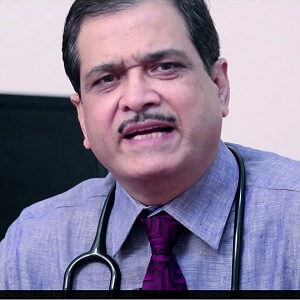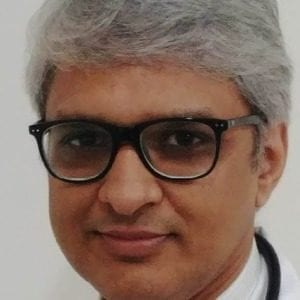Best Doctors in India for Cardiac Ablation
- Top Interventional Cardiologist | Apollo Hospital, New Delhi, India
- 26+ Years Experience
- Indraprastha Apollo Hospital, New Delhi
Profile Highlights:
- Dr. Rajeev Kumar Rajput is one of the best Cardiologists in India with nearly 23 years of experience. He is a clinical cardiologist engaged in diagnosing and treating cardiovascular diseases.
- Dr. Rajput is currently working as a senior consultant with Indraprastha Apollo Hospitals, New Delhi, and also offers patient care at the Heart & Gynae Clinic.
- Dr. Rajeev Kumar Rajput specializes in Angiography and Interventional Cardiology. The treatments provided involve Neonatal and Infant cardiac surgeries, Device Closure, and Valve replacement. He has expertise in Aortic Aneurysm Surgery, Vascular Surgery, Percutaneous Coronary Interventions, Endovascular Repair, Cardiac Catheterisation, Open Heart Surgery, and MV replacement.
- Dr. Rajput is credited with publishing several papers in noted medical journals.
- Cardiologist, Gurugram, India
- Over 20 years’ experience
Profile Highlights:
- Dr. Vivek Chaturvedi is a highly experienced and acclaimed cardiologist with over 20 years of experience.
- He has performed more than 2500 cardiac ablations, several of them for complex arrhythmias like atrial tachycardia, ventricular tachycardia, VPC, and atrial fibrillation using the latest technology like 3D Electroanatomic mapping.
- He has more than 50 publications in international journals & books.
- Interventional Cardiologist, Chennai, India
- Over 15 years’ experience
- Apollo Hospitals Greams Road
Profile Highlights:
- Dr. Sai Satish is a distinguished Senior Interventional Cardiologist affiliated with Apollo Hospitals in India, renowned for his pioneering contributions to the field of transcatheter valve therapies.
- His expertise extends internationally, as he also serves as a practicing interventional cardiologist and esteemed faculty member at the Gottsegen Institute of Cardiology in Budapest, Hungary, one of the world’s leading centers for TAVR (transcatheter aortic valve replacement) training.
- A trailblazer in the realm of minimally invasive cardiovascular procedures, Dr. Satish is celebrated for performing the highest number of percutaneous edge-to-edge mitral repairs (MitraClip implants) in the Indian subcontinent.
Best Hospitals in India for Cardiac Ablation
- City: New Delhi, India
Hospital Highlights:
- Over the last 33 years, the Fortis Escorts Heart Institute has set new standards in cardiac treatment with groundbreaking research. It is now known around the world as a centre of expertise for Cardiac Bypass Surgery, Interventional Cardiology, Non-invasive Cardiology, Paediatric Cardiology, and Paediatric Cardiac Surgery.
- The hospital has cutting-edge laboratories that perform a wide range of diagnostic tests in Nuclear Medicine, Radiology, Biochemistry, Haematology, Transfusion Medicine, and Microbiology.
- Fortis Escorts Heart Institute boasts a diverse group of bright and experienced doctors who are backed up by a team of highly qualified, experienced, and devoted support professionals as well as cutting-edge equipment such as the recently installed Dual CT Scan.
- Approximately 200 cardiac doctors and 1600 personnel currently collaborate to manage over 14,500 admissions and 7,200 emergency situations each year. The hospital now has a 310-bed infrastructure, as well as five cath labs and a slew of other world-class amenities.
- City: Faridabad
Hospital Highlights:
In the sprawling city of Faridabad, where healthcare needs are diverse and ever-evolving, one institution has consistently stood out as a beacon of excellence in the field of medicine—Marengo Asia Hospital. Established with a vision to provide world-class healthcare services to the community it serves, Marengo Asia Hospital has emerged as a trusted name synonymous with quality, compassion, and innovation in healthcare.
- City: New Delhi, India
Hospital Highlights:
- Equipped with 650 beds, BLK-Max Super Speciality Hospital is the largest stand-alone private sector hospital in Delhi.
- With over 1500 healthcare providers and 150 globally renowned super specialists, the hospital is one of Asia’s largest BMT Centres. The hospital is known for having some of the best cancer doctors in the country.
- The hospital is NABH and NABL accredited and was inaugurated by the first Prime Minister of India. Pt. Jawahar Lal Nehru.
- City: Chennai, India
Hospital Highlights:
- Located in Chennai, India, MGM Healthcare is a top multispecialty hospital that provides all medical services under one roof.
- Since its founding in 2019, MGM Healthcare has quickly become a leading national referral centre, creating several innovative flagship initiatives.
- MGM Healthcare combines next-generation medical and digital technologies to provide better patient results.
- With 12 centres of excellence, more than 400 inpatient beds, 100 intensive care unit beds, and 24/7 emergency care, MGM Healthcare leaves no chance in redefining the patient experience in Chennai.
- MGM Healthcare boasts 250+ expert doctors across 30+ departments, including Cardiology, Pulmonology, Neurology, Obstetrics & Gynaecology, and more.
- They house 12 specialized Centres of Excellence, including Neurosciences, Orthopaedics, and Multi-Organ Transplantation.
- Their team of doctors, nurses, and paramedics works together to give every patient individualized treatment.
- City: Noida, India
Hospital Highlights:
- Fortis Hospital, Noida, stands as one of the oldest and most trusted healthcare institutions in the region, setting a benchmark for comprehensive medical care.
- As the second mega hub hospital in the Fortis Healthcare Group, Fortis Hospital, Noida, upholds a legacy of trust among more than 1.2 million patients. By integrating top-tier professionals with cutting-edge technology, the hospital delivers superior treatment across various medical disciplines.
- Specializing in advanced Neurosciences, Orthopedics, Kidney and Liver Transplant Programmes, Fortis Hospital, Noida has successfully performed over 1,500 transplants, solidifying its reputation as a leader in specialized medical interventions.
Cardiac Ablation
Cardiac Ablation is a procedure that involves the use of energy for making small scars in the tissues of your heart. The energy stops unusual electrical signals that are moving through the heart and causing uneven heartbeat or arrhythmia. The procedure treats atrial fibrillation which is a type of irregular heartbeat. Your doctor will perform Cardiac Ablation if the medications and heartbeat resetting (also called cardioversion) fail to work.
Types of Cardiac Ablation
There are two ways of performing ablation. Catheter ablation is a more common one of the two. The other name for Cardiac Ablation is radiofrequency or pulmonary vein ablation. This isn’t a surgical procedure. Your doctor will put a catheter (a thin, flexible tube) into the blood vessels of your neck or leg to guide it to the heart. When the tube reaches the area causing arrhythmia, it will destroy the cells responsible for the same. This makes your heartbeats regular.
- Radiofrequency ablation– The doctor will send radiofrequency energy with the help of catheters to make circular scars around the veins or each group of veins.
- Cryoablation- The doctor will use a single catheter to send a balloon that has material tipped for freezing the tissues and cause a scar.
Types of cardiac surgical ablation : Surgical ablation will involve cutting your chest to gain access.
- Maze procedure- Your doctor will perform this while you are undergoing open-heart surgery for bypass or valve replacement. He or she will make small cuts in the upper portion of your heart while stitching them together to form a scar that stops unusual signals.
- Mini maze- In most cases, people with atrial fibrillation don’t require n heart surgery. Here the need for this procedure arises. Your doctor will make multiple cuts between the ribs while using a camera to perform catheter ablation.
- Convergent procedure- It involves catheter ablation with a mini-maze procedure.
Why it's done?
The procedure helps to correct the problems with heart rhythm. The electrical impulses causing the contraction of your heartbeats must follow a specific pathway through the heart. Arrhythmia or abnormal heartbeat happens due to an interruption in these impulses that are treatable with Cardiac Ablation. Cardiac Ablation is the right option for those who:
- Tried medications for arrhythmia but didn’t get any results
- Had serious side effects because of medications that treat arrhythmia
- Are at a high risk of complications due to arrhythmia
Benefits
Preparation
What to expect?
During the procedure
Your doctor will perform the procedure in the hospital. The nurse will place an IV line in your forearms before beginning the procedure and give you a sedative so that you relax. Your doctor might use general anesthesia instead to make you fall asleep. Your doctor will numb the area near your neck, groin, or forearm after the effects of the sedative set in. The team will then insert a needle into your vein while placing a sheath through this needle.
This is followed by threading the catheters through your sheath and guiding them to various places in your heart. Next, they will inject a dye into the catheter that allows your doctors to see the blood vessels and heart using x-ray imaging. Electrodes are present at the tip of the catheters that help to send electrical impulses to your heart and record the electrical activities of your heart. This process involving tests and imaging for determining the cause of arrhythmia is known as electrophysiology study (EP study). The doctors perform this before Cardiac Ablation to check the most effective way of treating arrhythmia.
Upon identifying the abnormal heart tissue responsible for causing heart arrhythmia, your doctor will direct the catheter tips towards the abnormal tissue of your heart. The catheter tips will allow the energy to create scars and destroy the tissue causing the arrhythmia. Ablation might block electrical signals traveling through the heart so that the abnormal rhythm stops while allowing signals to travel in a normal pathway. The procedure takes around 4 to 5 hours but it may take longer if the procedure is complex.
After the procedure
The nurse will move you to a recovery area so that you can rest quietly for 5 to 6 hours and there is no bleeding at the catheter site. The team will monitor your heartbeat and blood pressure to check if there are any complications. You can go back home on the same day as the procedure if you are in a good condition. However, you may need to stay overnight if your case is complex. Although you may experience soreness, it will hardly last a week. You will also be able to perform routine activities after some days of the procedure.
Results
Risks
The risks associate with Cardiac Ablation are:
- Bleeding on the site of insertion of a catheter
- Infection
- Arrhythmia due to damage to the electrical system of your heart
- Damage to your heart
- Narrowing of the veins present between the heart and the lungs
- Radiation
- Damaged heart valves
- Damage to the blood vessels due to scraping
- Radiation
- Heart attack
- Blood clots in your lungs or legs
- Kidney damage because of the dye
- Stroke
- Death









